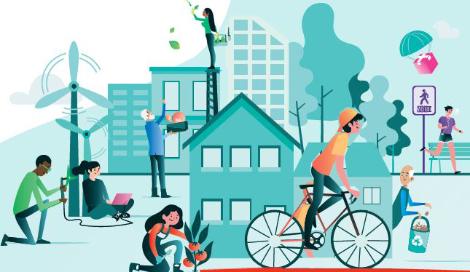Tomorrow my territory 20 Training young people in eco-citizenship
Youth Action
November 2019
Agence pour l’Environnement et la Maîtrise de l’Energie (ADEME)
The 20 factsheets in the collection « demain MON TERRITOIRE » have been designed to give candidates and elected officials practical keys to take action, to open up the field of possibilities based on the experiences of other elected officials, from small towns to conurbations, large urban areas or sparsely populated areas. In the four corners of France, both in metropolitan France and in the French Overseas Territories, many of them are taking action, together with the players in their territories, to prepare for the future by taking action to mitigate climate change and adapt to its effects. With its knowledge and presence throughout the country, ADEME supports them with its tools, activities and financial aid.

Why is it important to educate youth about good deeds?
Young people play a vital role in the evolution of our society and particularly in environmental matters. Increasingly sensitive to environmental protection and climate issues, children and adolescents are the best ambassadors of good deeds for the planet. However, it is not always easy to mobilize young people on issues that may seem technical to them, such as climate change. Through its actions in schools, in conjunction with the teaching staff, and in extra-curricular activities, with leisure and activity centres, the community has an essential lever of action to involve the youngest in its environmental policy and to train future eco-citizens.
How do you do it?
-
In schools and leisure centres: energy-efficient buildings are being renovated or constructed that retain heat in winter and coolness in summer, are pleasant to live in with greenery, and have ventilated spaces that do not require air conditioning. Renewable energy sources are being considered to provide hot water (solar), heating (geothermal, wood) or electricity (solar panels). We involve young people in the structural choices around the building.
-
In canteens: we fight against food waste. A local employee is being mobilised to raise awareness among children and to implement concrete actions such as weighing waste after the service. Producers are invited to come and meet the children to explain how they produced the food served in the canteen. If space is available, a composter is installed and the children are involved in its maintenance. Space is provided at the school or activity centre to set up an educational vegetable garden.
-
For events (school fête, sports competitions, end-of-year shows, etc.), we set ourselves a « zero waste » objective: we use reusable crockery, organise waste sorting, and decorate with recycled materials.
-
A municipal youth council is set up, with a representative from each class, elected by its peers, from CM1 onwards. A climate committee is proposed and a small budget is allocated to carry out actions in the area in relation to waste management, mobility, living conditions and eco-citizenship.
-
We are working with the educational team and parents to make mobility easier around places where children are present: a calmer traffic area, or even a ban on cars in the immediate vicinity. We set up a pedi-bus (pedestrian school bus), we create safe cycling routes…
-
Municipal employees are also involved in raising awareness among young people: municipal police officers train them in cycling and pedestrian safety rules; cleanliness officers inform them about waste sorting and responsible consumption, and biodiversity for those in charge of green spaces.